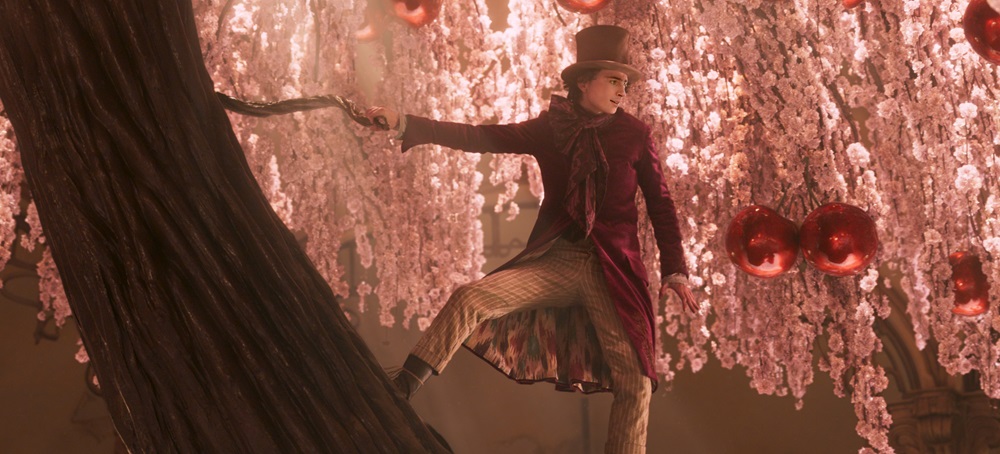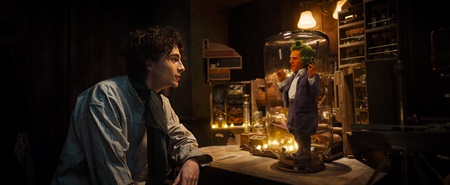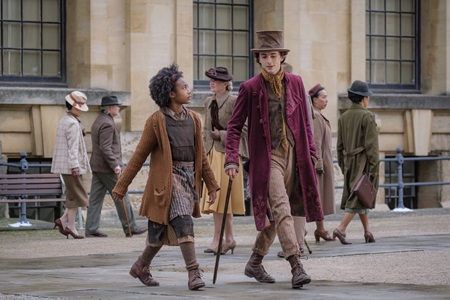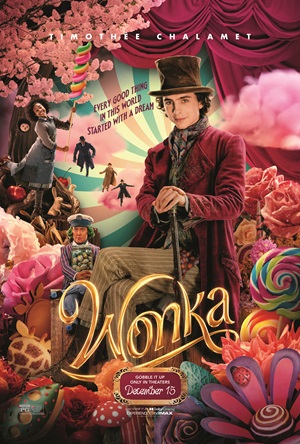
Imaginative Wonka is a Scrumdiddlyumptious Surprise
I try to not prejudge any motion picture before I’ve watched it, but I can’t say the thought of Wonka — more a prequel to 1971’s Willy Wonka & the Chocolate Factory than a variation on Roald Dahl’s 1964 novel — brought a smile to my face. For all his talent, I couldn’t see Timothée Chalamet stepping into Gene Wilder’s shoes. The first officially released images looked too garish and over the top. Irish singer-songwriter Neil Hannon was going to have a heck of time matching — let alone topping — Leslie Bricusse and Anthony Newley’s award-winning songs from the original film.
But with Paddington and Paddington 2 director Paul King at the helm of this new musical adventure featuring the eccentric chocolatier, my worries were much ado about nothing. While not without its missteps, this is still a cinematic treat overflowing with pure imagination. More importantly, King once again shows how deftly he can walk a fine line between child-friendly absurdity, emotional authenticity, and outlandishly inventive comedic ingenuity, and this helps make Wonka 2023’s most scrumiddlyumptious surprise.
Fresh off the boat and with only a pocketful of coins to his name, Willy Wonka (Chalamet) has come to the fabled Galeries Gourmet to open a chocolate store exactly like the one he and his beloved late mother (Sally Hawkins) used to dream about when he was a boy. But before he can sell his first treat, a cabal of greedy chocolatiers, led by the Machiavellian Slugworth (Paterson Joseph), convince the local constabulary and their chocolate-addict chief of police (Keegan-Michael Key) to shut the young man down.
With no place to stay and now without a penny in his purse, Willy is shanghaied into working in the laundry for the despicable Mrs. Scrubbit (Olivia Colman) and her odious righthand man Bleacher (Tom Davis). But the resourceful magician and expert treat maker has a few tricks up his svelte purple sleeves. With the aid of orphaned maid Noodle (Calah Lane) and the partnership of his fellow indentured servants Abacus Crunch (Jim Carter), Lottie Bell (Rakhee Thakrar), Piper Benz (Natasha Rothwell), and Larry Chucklesworth (Rich Fulcher), Willy will be a success, and not even a chocolate-stealing Oompa-Loompa (Hugh Grant) will stop him.
The whimsy level is preposterously high, and it isn’t until Willy encounters Mrs. Scrubbit and her unreadable rent-a-room-for-the-night contract that King gets a handle on things. The opening musical number is more obnoxious than it is endearing, and the overtly cartoonish production design from six-time Academy Award nominee Nathan Crowley (Tenet, First Man) takes some getting used to. Where Willy Wonka & the Chocolate Factory director Mel Stuart kept things grounded before hurtling headfirst into Dahl-crafted absurdity once Wilder somersaulted across the screen, Wonka immediately hits the visually bonkers bull’s eye, and that’s not necessarily a good thing.
But when King does right the ship, he does so with pizazz and style. As both Paddington efforts proved, the filmmaker has an innate ability to channel his inner child in a way that is equally enthralling to adult viewers. More importantly, his script — cowritten with his Paddington 2 partner Simon Farnaby — never panders to the youngsters in the audience. Like Dahl’s books, King isn’t afraid to go into some fairly dark recesses of the human condition. But he does so in ways that are goofily scary, not terrifyingly so, and that allows hearty giggles and shocked gasps of wonderment to rhapsodically coexist with zero polarization.
Chalamet doesn’t make even a passing attempt to channel his inner Wilder, and that’s a smart move. But this is also the loosest, most idiosyncratically alive the actor has ever been. He’s fearless when it comes to the singing and the dancing, and while he isn’t especially great at either, his exuberance is so enchanting that the reality that he can barely carry a tune weirdly becomes more of a plus than a minus. Chalamet is having fun, especially in his scenes with the captivating Lane, as the pair’s chemistry is out of this surrealistic world.
The supporting cast is universally excellent, the cantankerously persnickety Grant most of all. A giant second-act set piece in which Willy brings guests into a small, pre-vis version of his fabled “candy room” from the 1971 film is magnificent, while a giant rooftop dance number with Chalamet and Lane held me spellbound. There’s also a splendid bit in Mrs. Scrubbit’s underground laundry prison in which all of the forced laborers learn just how inventive Mr. Willy Wonka truly is, and I echoed their looks of amazed stupefaction.
One element does almost derail the fun, and it concerns Key’s morally flexible law enforcement officer. A running gag involves his chocolate addiction, with the corrupt policeman extorting Slugworth and his pals for more and more boxes of candy as payment to keep him on their payroll. This causes him to gain more and more weight throughout the story, and while the makeup and prosthetic effects showcasing Key’s transformation are impressive, there is an unspoken ugliness to this subplot that’s uncomfortably jarring.
Thankfully, King never allows this film to laugh at the character. Granted, I can’t say it laughs with him, either, but all things considered, that the chief of police is never the actual butt of any joke is astonishing. It helps that Key is a gifted comedian and knows exactly what he is doing, and that none of the hero characters — namely Wonka himself — make a vulgar fat joke no matter how large he is by the end. But, as much as the man’s size fits Dahl’s literary world, I’d rather the filmmakers had rethought this one. The character makes a sour enough impression that he almost ruined my fun.
Happy to say that didn’t happen. In large part due to a splendid climax in a church guarded by a bunch of chocolate-obsessed monks (led by Rowan Atkinson, no less) in which Slugworth’s true motives for confectionary domination are revealed, I exited the theater with a smile on my face and a skip in my step. As if it were traveling in a great glass elevator into the stratosphere, Wonka soars, and it didn’t take a golden ticket to go along for the ride.
– Review reprinted courtesy of the SGN in Seattle
Film Rating: 3 (out of 4)








